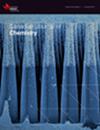N, O, P掺杂石墨烯催化剂催化丙烷直接脱氢的密度泛函理论研究
IF 1
4区 化学
Q3 CHEMISTRY, MULTIDISCIPLINARY
引用次数: 0
摘要
采用密度泛函理论(DFT)计算了石墨烯上掺杂N、O、P等非金属单原子催化剂在丙烷直接脱氢反应中的反应机理和选择性。结果表明,PDH的速率控制步长随掺杂原子的不同而不同。我们还发现,N, O, P非金属单原子掺杂石墨烯催化剂对丙烷的吸附性能相对较低,活性位点是与N, O, P相邻的C原子,而不是掺杂原子本身。有趣的是,掺杂o的石墨烯催化剂可以通过寻找多个过渡态来降低反应能垒。结果表明,p掺杂丙烷直接脱氢反应反应速度控制阶跃的能势垒最低,为44.32 kcal·mol−1,深度脱氢反应的能势垒为53.08 kcal·mol−1,具有较好的选择性。因此,p掺杂石墨烯催化剂作为丙烷直接脱氢的非金属催化剂具有广阔的应用前景,为设计廉价环保的催化剂提供了可能。本文章由计算机程序翻译,如有差异,请以英文原文为准。
Density Functional Theory Study on Direct Dehydrogenation of Propane Catalyzed by N, O, P Doped Graphene Catalysts
The density functional theory (DFT) was used to calculate the reaction mechanism and selectivity of nonmetallic single-atom catalysts, such as N, O, and P, doped on graphene in the direct dehydrogenation of propane (PDH). Our results show that the rate-controlling step in PDH varies with the doping atom. We also found that N, O, and P nonmetallic single-atom-doped graphene catalysts showed relatively low adsorption performance for propane and the active site was the C atom adjacent to N, O, P, rather than the doped atom itself. Interestingly, for the O-doped graphene catalysts which can reduce the reaction energy barrier by searching for multiple transition states. Finally, the results show that the energy barrier of P-doped propane direct dehydrogenation reflecting the speed control step is the lowest, which is 44.32 kcal·mol−1, and the energy barrier of deep dehydrogenation is 53.08 kcal·mol−1, so it has good selectivity. Therefore, the P-doped graphene catalyst has a promising application as a nonmetallic catalyst for the direct dehydrogenation of propane, which provides the possibility for the design of cheap and environmentally friendly catalysts.
求助全文
通过发布文献求助,成功后即可免费获取论文全文。
去求助
来源期刊

Canadian Journal of Chemistry
化学-化学综合
CiteScore
1.90
自引率
9.10%
发文量
99
审稿时长
1 months
期刊介绍:
Published since 1929, the Canadian Journal of Chemistry reports current research findings in all branches of chemistry. It includes the traditional areas of analytical, inorganic, organic, and physical-theoretical chemistry and newer interdisciplinary areas such as materials science, spectroscopy, chemical physics, and biological, medicinal and environmental chemistry. Articles describing original research are welcomed.
 求助内容:
求助内容: 应助结果提醒方式:
应助结果提醒方式:


